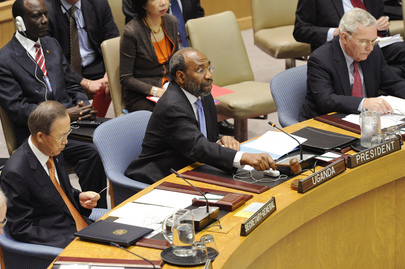
For him, the biggest challenge is when diplomats have to participate in negotiations such as the World Trade Organisation, which have a long winding history.
“You need to be very knowledgeable because for years there have been deadlocks about these agreements. You need to be familiar the interests of many things, the interests of Uganda and what Uganda can achieve,” he says.
Gakwandi, also formerly Uganda’s Ambassador to the African Union in Addis Ababa in the 1990s, says as an ambassador, one has to deal with bodies like World Intellectual Property Organisation, human rights, labour laws and how they shape a country’s standing. He says the appointment should not just be made to fill up a position.
“At times you need to head a team of economists, lawyers, (and) other countries have highly technical stuff but since Uganda is a poor country, we tend to be thin on the ground,” he said.
Gakwandi says it is high time, training of diplomats is formalised.
Prof Semakula Kiwanuka, a former Ambassador of Uganda to United Arab Emirates, says having worked in the UN system before he was posted to the UN as Uganda’s Permanent Representative in 1996 under the Boutros Boutros-Ghali era, was an advantage. He had worked in the United Nations Environment Programme and was part of the advance team that worked to set up the Ministry of Environment. He had also previously been the Senior Consultant on Africa at the UN, and was well read on health, agriculture, and education issues.
He says the fears around political appointees messing up foreign missions may be unfair. He does not agree with some civil servants at the Ministry of Foreign Affairs, the so-called career diplomats, who feel they are locked out by political appointees.
“I understand why civil servants are complaining that they are being locked out. But how much do these people at the Ministry of Foreign Affairs know about their government? Being at the Ministry may not make you better placed to serve as a diplomat than as an individual who has been a Minister, because in all ministries, they deal with issues affecting other governments.”
Prof Kiwanuka who has served as a Minister of state for Investment says people who have served as minister or even in Parliament are experienced enough to head foreign missions. According to him, if you have a Permanent Secretary doing a good job at the Ministry of Trade, why not send them to WTO instead of someone from Foreign Affairs because these are highly technical matters.
To him, diplomacy is about a whole lot of things that includes trade, finance, food, security and more. He says if civil servants are just appointed ambassadors from nowhere, the issue of lack of adequate preparation and requisite training will remain.
Kiwanuka argues that in countries like U.S., their top embassies are headed by political appointees because of their understanding of global issues and measured experience.
“The UN is essentially a political organisation and I had a political background. When Ruhakana Rugunda, the Prime Minister went to New York as Uganda’s Representative to the Security Council, did he have to be a civil servant?” he says.
Attempts to get a comment from the Ministry of Foreign Affairs on what training Ugandan diplomats can expect failed.
However, it is clear that sometimes an ambassador is sent to a certain country because of the unique relationship the country has with Uganda. For instance, Maj Gen. Nathan Mugisha was appointed Ugandan Ambassador to Somalia because of his appreciation of the internal dynamics of the troubled country. He had served in Somalia as the second African Mission in Somalia (AMISOM) commander between 2009 and 2011. A few months after his military tour of duty ended, he was posted to the country as a Deputy Ambassador.
Angelina Wapakhabulo, a Tanzanian by birth, was appointed Uganda’s ambassador to Kenya in a spirit of East Africa’s solidarity, some sources say because of historical ties between her, her late husband James Wapakhabulo, former Minister for Foreign Affairs and President Museveni who were contemporaries at Dar-es-Salaam University in the 1960s.
Parliamentary Committee on Foreign Affairs boss Sam Okuonzi says the committee has written to President Museveni to strengthen specific areas in Uganda’s foreign missions. He says the Committee has listed members that lack diplomatic etiquette or have left their stations of duty worse off.
According to Okuonzi, political appointees heading missions abroad is not necessarily a bad thing because the scope of diplomacy has expanded further from the traditional role. He says this is because their mandate now includes political mobilisation to make sure that the country’s interests are pursued, boosting the image of the country, and attracting tourism, high-tech opportunities and scholarships.
“Anyone who is trained can do that. Some politicians have done better than career diplomats not just in Uganda alone but when you look at countries like Iran,” he says.
 The Independent Uganda: You get the Truth we Pay the Price
The Independent Uganda: You get the Truth we Pay the Price



Andrew, I enterely disagree with the so called omagh, yes failed politicians have been appointed to head foreign missions in order to accommodate their interest or as a welfare option. For me the key issue is that most of these ambassadors don’t know what to do at the mission only seat in the office and earn a wage, some of them have been involved in smuggling. I have visited a number of missions abroad such as, Japan, London, new York, Burundi, kenya, etc but what I see is all these ambassadors are useless to we diaspora, what we need is some one chosen from the diaspora them self’s with good grasp and understanding of the country not new people with no clue on the country.
Its only diaspora that can succeed in this job not outsiders with no grasp of the country they are being sent to work in, we have lived and worked in these countries for long enough,therefore we are better placed than any body to represent uganda abroad in our respective countries of domicile. Last time I visited the London mission had brief meeting with ambassador, I saac biruma, I was disappointed by his narrow and shallow views or thinking on how manufacturing could be adopted by uganda, my explanation was that we need to organise our diasporas in the UK to help implement that task of adopting manufacturing in uganda, he was off target no idea at all. No contacts,no conections enterely disappointed by this man. I have 14 yrs experience in Morden manufacturing started in nagoya Japan and now uk, I understand the fundamental knowledge required to manufacture fully equipped with a 347 page manual compiled by my self to help my mother land uganda but wrong ambassadors are a huge problem. If uganda is to progress in this capitalist world work should begin with calling upon the diaspora and get them involved like what other countries such as China, India ,parkstan have done trusted their diaspora and handed some important tasks to them, to you can what these countries are, using western knowledge to develop their countries back home. We know how production can be done, we don’t need Chinese or Indians to teach us, we have learnt these knowledge from high tech countries, there uganda should think carefully and call upon the diaspora community to do the job to implement production and distribution in uganda not foreigners, who just looking for profit from society, we are interested in teaching society the strategic abilities required to attain competitive advantage.
It is funny that we come to uganda we have to pay for a visa and require a work permit, this is rediculus, museveni should be ashamed for poor reasoning ,judgement, and poor decision making.